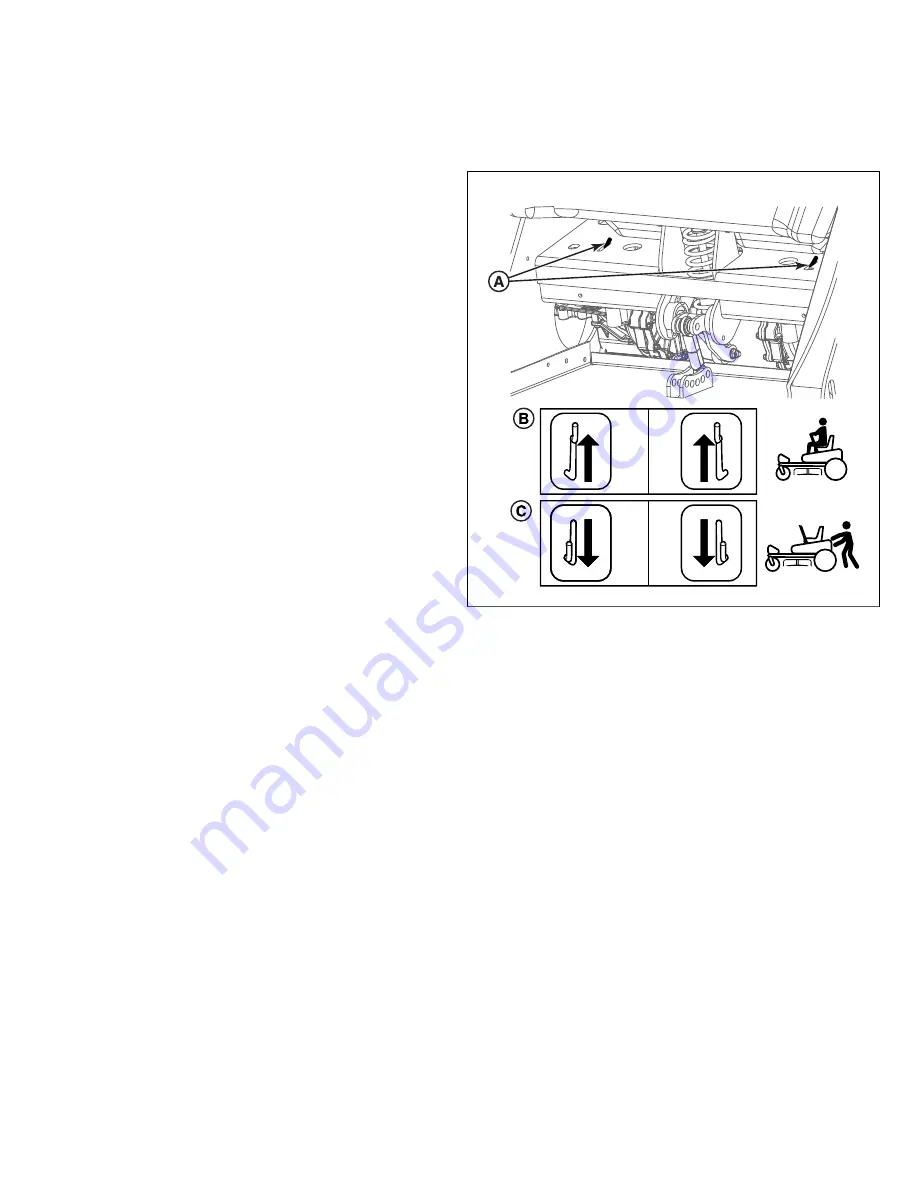
Not for
Reproduction
20
manual gear models). If you hear the engine slowing down
you are mowing too fast, use a slower ground speed.
How Much Grass to Cut Off When Broadcasting:
Mow when the grass is 3-5 inches long. Do not cut the grass
shorter than 2 to 2-1/2 inches. Do not cut off more that 1 inch
of grass in a single pass.
Mulching
Mulching consists of a mower deck which cuts and re-cuts
clippings into tiny particles and which then blows them down
INTO the lawn. These tiny particles decompose rapidly
into by-products your lawn can use. UNDER PROPER
CONDITIONS, your mulching mower will virtually eliminate
noticeable clippings on the lawn surface.
Note:
When mulching under heavy cutting conditions, a
rumbling sound may be present and is normal.
Mulching Requires EXCELLENT Mowing Conditions:
Mulching mowers cannot function properly if the grass is wet,
or if the grass is simply to high to cut. Even more than normal
mowing, mulching requires that the grass be dry and the
appropriate amount is cut.
Do not use the mower as a mulching mower during the
first two or three mowings in the spring. The long grass
blades, quick growth, and often wetter conditions are more
suitable for broadcasting (side-discharging) or grass bagging
operation.
Engine Speed & Ground Speed for Mulching:
Use full engine throttle matched with a slow ground speed so
that clippings will be finely cut. Ground speed while mulching
should be HALF of the speed that would be used when
broadcasting (side discharging) under similar conditions.
Since mulching requires more horsepower than broadcasting,
using a slower ground speed is vitally important for proper
mulching operation.
How Much Grass to Mulch:
The best mulching action typically results from cutting only
the top ½ inch to 3/4 inch of grass blade. This provides
short clippings which decompose properly (much more
quickly than longer clippings). The ideal cutting height will
vary with climate, time of year, and quality of your lawn. We
recommend that you experiment with both the cutting height
and ground speed until you achieve the best cut. Start with
a high cutting height and using progressively lower settings
until you find a cutting height that is matched to your mowing
conditions and preferences.
Pushing the Unit By Hand
NOTICE
Do NOT tow the zero-turn rider.
Towing the units while the transmissions are engaged will
cause hydraulic transmission damage. Do not use another
vehicle to push or pull this unit.
1. Disengage the PTO, engage the parking brake, turn the
ignition OFF, and remove the key.
2. Raise the operator support cushion to gain access to
the transmission release levers (A, Figure 19) which
are located on the back of the engine deck. There is
one transmission release lever on each transmission.
The transmission release levers open and close the
transmission bypass valves.
19
3. To open the transmission bypass valves (bypass
position), pull both transmission release levers back and
out (C) so they lock in the bypass position.
4. Disengage the parking brake. The unit can now be
pushed by hand.
5. After moving the unit, close the bypass valves (run
position) by pulling the transmission release levers
rearward and inward (B) to release them from the bypass
position and then allow them to move forward to the run
position.
6. Lower the operator support cushion back into place.
Note:
Both transmission release levers must be in the same
position.
Storage
Temporary Storage (30 Days or Less)
Remember, the fuel tank will still contain some gasoline, so
never store the unit indoors or in any other area where fuel
vapor could travel to any ignition source. Fuel vapor is also
toxic if inhaled, so never store the unit in any structure used
for human or animal habitation.






























